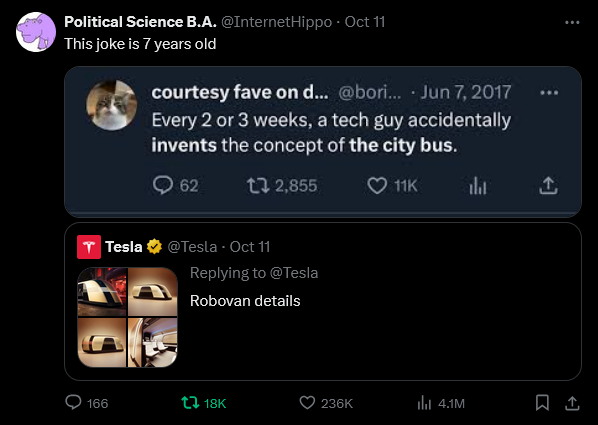this post was submitted on 13 Oct 2024
1171 points (98.8% liked)
Microblog Memes
6459 readers
1863 users here now
A place to share screenshots of Microblog posts, whether from Mastodon, tumblr, ~~Twitter~~ X, KBin, Threads or elsewhere.
Created as an evolution of White People Twitter and other tweet-capture subreddits.
Rules:
- Please put at least one word relevant to the post in the post title.
- Be nice.
- No advertising, brand promotion or guerilla marketing.
- Posters are encouraged to link to the toot or tweet etc in the description of posts.
Related communities:
founded 2 years ago
MODERATORS
you are viewing a single comment's thread
view the rest of the comments
view the rest of the comments

Most of those can addressed by busses too actually.
Bus Rapid Transit (BRT) or any bus line can have less stop for this reason. To expand on BRT routes, they can be dedicated lanes for busses, with right of way. They can be specific only for busses, and cars not allowed to use it ever or also mixed usage where certain rush hours are for bus use only but outside those hours can be used by other vehicles.
This can also be done with BRT routes.
BRT as well.
Busses can absolutely support this. Paris has more open busses to allow more people standing or people with disabilities.
With dedicated BRT lanes, I believe that can also be done considering there's only bus stops that need to be slowed down on.
I know technically electric busses are possible, but I'm not certain how feasible this is.
My understanding is that BRT routes are cheaper and faster to setup than trains, and can be upgraded to trains. I'm not saying BRT is better than light or heavy rail, but that should be a more common path for mass transit that is not utilized in the US.
For this discussion, you're really torturing the definition of a bus if you're going to use BRT to mean busses. BRT does not meet most peoples definition of "city bus" as the conversation up to now has suggested.
BRT would nearly always be a zero sum solution to make your statement true. You would have to subtract from current roads that accommodate traffic to create BRT to meet your metric. Land, espeically in dense cities is nearly always already allocated. If anything besides the zero sum BRT, light rail would likely be a better choice than BRT because it can subterranean or elevated with fewer building challenges/dangers.
I'm interested in an example of a city you have a in mind that BRT would be a better choice than city busses or light rail.
we can help solve this by using plastic breaks on trains
Lol
finally someone who provides a solution to the problem!
most politicians still don't know what the problem is.
Hey, BRT is great! I'll happily support that rather than building regular car infrastructure.
I also still vastly prefer the train. Or a ferry, if that's an option.
Point not brought up by the other person: Bicycles. I am primarily a bike commuter, and have had one good experience with a bike and bus:
Last bus out of the city, like 2:30am. Driver has no time for our shit, tells us to bring them inside and hang on, to hell with the front rack. We didn't even pay.
I've also had my bike half pop out of said front rack, get taco'd, and got absolutely nothing out of it. Totally fucked. No restitution.
Best case with bikes on a bus is you get lucky and get a spot, usually you're better off just riding the whole way.
Trains, have room. Never not made a train with my bike.
Believe it or not, RTD (regional Denver) is building BRT right now. Blew my mind. I'm looking forward to it
https://www.codot.gov/projects/studies/denvermetrobrt